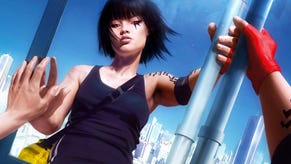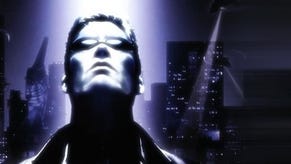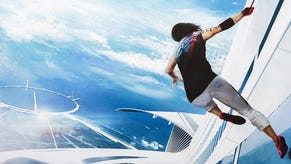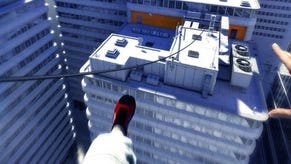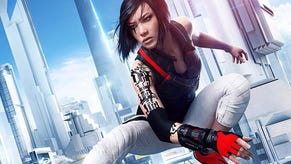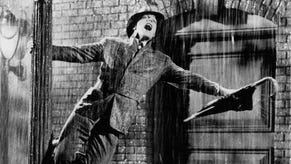Mirror's Edge
Runner up?
But a more serious stumble is the indoor bits. In the open air, with huge chunks of freshly scrubbed city stacked around you, Mirror's Edge recalls all the right memories of Jet Set Radio, but inside it struggles. The muddled layouts lack direction, with few useful indicators of where to go next and an unhelpful smattering of red herrings. Equally, the hint button, which works fine outside when you've got nothing but horizon, often directs you straight towards your target when you're indoors, rather than at the path you need to take to reach it. Sometimes it just points at the floor, for example, or at a blank wall, rather than explaining you need to pull off a string of handsprings and wall-runs in the opposite direction to get round it. The best linear videogame levels guide you without letting you know it; the ones in Mirror's Edge often blindfold you, spin you around a couple of times, and then let you wobble off down a nearby manhole.
Like everything else with the game, there's an element of acclimatisation to this: as you progress, you get better at working out where you're meant to be going indoors, even if the game doesn't get better at giving you clues. But the propensity for asset repetition can be disastrously confusing in claustrophobic interiors, and it's not helpful that it's at exactly these moments your Runner's Vision often takes a sabbatical. Throw some armed pursuers and nasty falls into the mix, as DICE often does, and you become conscious that you can only work out how to do something right by first doing it wrong and being sent back to the (very occasionally sadistic) last checkpoint.
These problems are inevitable given the kind of experience Mirror's Edge is trying to provide - a parkour game where you didn't end up as a puddle now and then would be like a driving game without crash barriers - but while it's a resounding victory that the first-person viewpoint is almost never responsible for your demise, the trial-and-error approach the game requires to challenge you can put fatal breaks in the sense of flow - and that flow is the very best thing about Mirror's Edge.
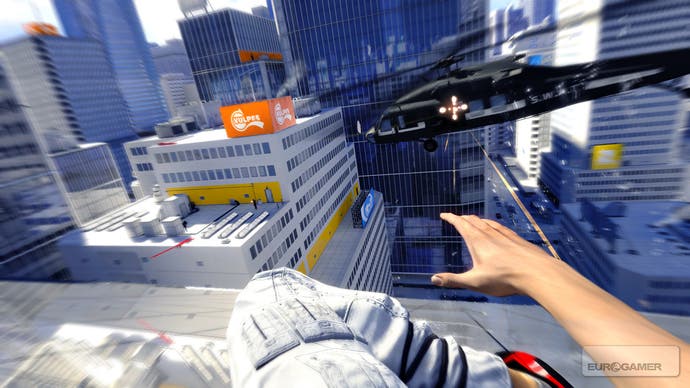
Even on the rooftops, in the game's safety zone, some may find this a very linear experience, with a scant handful of routes to uncover. It's not repetitive - despite the endless white skyscrapers, and iPod-colour interiors, the game finds time to take you from the top of the city to the bottom, from penthouses to storm drains, via subway tunnels, dockyards, shopping malls, and offices - but it is a funnel more than a sandbox. And while the world is filled with chic details, it's devoid of a human presence other your pursuers. There are no office workers, no pedestrians, not even a stray window-cleaner. Perhaps the people, like the promise of a looser, rangier environment, would simply get in the way: Mirror's Edge may be a platformer at heart, but it has a racing line that rivals Forza.
Linearity isn't the only thing that's going to frustrate. Mirror's Edge is sweet, but short - I got through it in two evenings, so while I didn't want to stop, after seven or so hours I had to, because I'd run out of game. There's speed-running and leaderboards, collectables and those secret paths, but if that isn't in your genetics you're going to feel slightly short-changed. And while the visuals are great, the performance isn't always up to task. There are some weak textures up-close (a problem in a game where you spend a lot of time looking at things while squashed against them), and, while the frame-rate is blessedly unwavering, there's a lot of screen-tearing. Playing on a PS3 and testing both standard and HDTVs, I couldn't improve the performance or locate a v-sync option.
Perhaps, then, Mirror's Edge is a game that's easier to love than like. After all, love is the most subjective emotion, and if you're being objective, it's full of little annoyances. It's not surprising that people are comparing it to Assassin's Creed, but in reality it's almost an opposite: it's dynamic, punishing and too short, rather than repetitive, forgiving, and drawn out, and each game's take on gameplay (and on parkour) couldn't be more different.
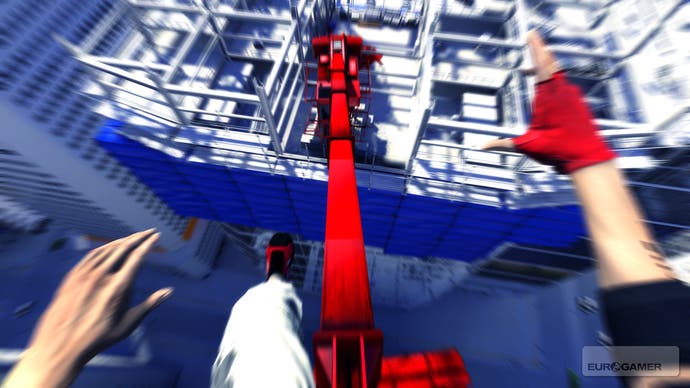
What both share, however, is that ability to polarise. It's irritating that a game gets so much right while getting so much wrong at the same time. Previews promised something you hadn't seen before, but on closer inspection DICE has brought huge chunks of the tired and familiar along too, in the game's constant restarts, its railroading, and its fondness for making you crawl through air vents; the result is a postcard from the future, rather than a one-way trip.
There's something broken thematically, deep within Mirror's Edge: it tells you a rambling story about freedom even as it confines you to the tight squares of its own personal hopscotch court, and for many that will be one wrong-footing too many. But for those who can shrug off the contradictions and the limitations, ignore the tearing cityscape and lingering qualms about value for money, this will shove you so deeply into the experience of being in someone else's body, and taking it on a terrifying, breakneck joyride, that nothing else will matter.
If you're still undecided, I suggest a leap of faith: after all, you may be one of us who end up loving it.

